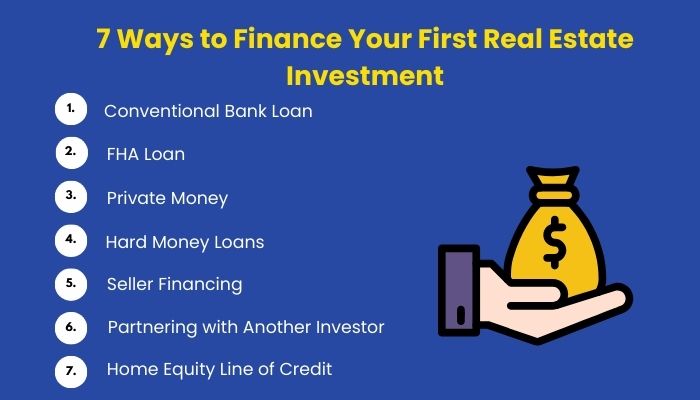You’ve been reading, researching, watching YouTube videos, listening to podcasts, maybe even attending local meetups.
You’re ready to invest in real estate.
Maybe you’ve even picked your market and are watching the listings like a hawk.
But there’s still one big question staring you in the face: How are you going to pay for your first deal?
If you’re like most first-time investors, you don’t have hundreds of thousands of dollars sitting in your bank account. But the good news is…you don’t need to.
There are a variety of creative and traditional ways to finance that first property. You just have to figure out which one makes the most sense for your goals, timeline, and resources.
Here are several different ways to finance your first real estate investment.

Contents
1. Conventional Bank Loan
This is the most straightforward and traditional way to finance your first investment property. If you have decent credit, stable income, and enough for a 20 to 25 percent down payment, a conventional loan through a bank or mortgage lender may be your best option.
The upside? Interest rates are typically lower than other financing methods (even with today’s rates). Plus, if your financials are solid, you may be able to lock in favorable terms and predictable monthly payments.
The downside? You’ll need to come in with a larger chunk of cash upfront, and banks tend to be more conservative – especially when it comes to investment properties.
You’ll likely need to show tax returns, bank statements, proof of income, and possibly even reserves to cover several months of mortgage payments.
Still, if you’re playing the long game and want to build a real estate portfolio with solid foundation loans, this is a great place to start.
2. FHA Loan (House Hacking)
If you’re buying a multi-family property – like a duplex, triplex, or fourplex – and plan to live in one unit, you might qualify for an FHA loan. This is one of the most powerful tools for new investors, because it allows you to get in with as little as 3.5 percent down.
That’s right. You can buy a $400,000 triplex, live in one unit, and rent out the other two – all while putting down under $15,000.
This strategy is often called house hacking, and it’s one of the smartest ways to dip your toes into real estate investing. You get to live for little to nothing while building equity and learning how to manage tenants.
The catch? FHA loans are only available for owner-occupied properties, and they require mortgage insurance. Still, it’s a great stepping stone into the investing world.
3. Private Money
Don’t have great credit or a big down payment? Private money might be your ticket.
Private money is funding that comes from individuals – not banks. Think friends, family, business acquaintances, or fellow investors with cash but not the time or desire to find deals themselves. You offer them a solid return on their money, and in exchange, they fund all or part of your deal.
This type of financing is all about relationships and trust. There aren’t rigid credit checks or underwriters involved. You just need a clear agreement, a strong value proposition, and a plan to pay them back.
The best way to get started with private money is to build a reputation. Start going to networking events, join local real estate investor associations, and talk openly about what you’re working on. When people see that you’re serious, ethical, and informed, they’re more likely to want to work with you.
4. Hard Money Loans
Hard money lenders are professional lenders who specialize in real estate investments – especially fix-and-flips or short-term deals.
These loans are asset-based, meaning the lender is more concerned with the deal itself than your personal financials. They’ll look at the ARV (after-repair value) of the property, your experience level (if any), and how quickly you can turn it around.
Hard money is fast and flexible. You can often get funding in days rather than weeks. But it’s expensive. Interest rates are high (think 9 to 15 percent), and terms are short (usually 6 to 12 months). This isn’t for a long-term buy-and-hold.
Still, if you’ve got a great deal on a distressed property but need fast cash to close, a hard money loan could make it happen. Just make sure you have an exit strategy – whether that’s refinancing into a traditional mortgage or selling the property for a profit.
5. Seller Financing
This is one of the most underrated financing options, and it’s especially useful in a soft market or when dealing with motivated sellers.
With seller financing, the seller acts as the bank. Instead of you getting a loan from a lender, the seller allows you to make payments to them directly over time.
Let’s say a seller owns a property free and clear. You negotiate a price, agree on terms (interest rate, monthly payment, loan term), and put it in writing. You might give them a small down payment, and then you pay them monthly until the property is paid off or you refinance.
Seller financing often doesn’t require a credit check, and it gives you the flexibility to negotiate terms that work for both parties. It’s great if you’re just getting started and want to avoid dealing with banks.
The key is to look for sellers who are open to the idea – often retirees, landlords tired of managing tenants, or people in life transitions who just want cash flow rather than a lump sum.
6. Partnering with Another Investor
You don’t always have to invest alone. In fact, teaming up with someone who has complementary skills or resources can make your first deal much easier.
Maybe you have time, hustle, and a knack for finding deals. Someone else has capital and experience but doesn’t want to do the legwork. That’s a win-win.
You can split profits, share risk, and learn the ropes from someone who’s done it before.
Just make sure your partnership is based on clear communication and expectations. Draw up an agreement that outlines:
- Who does what
- How profits are split
- What happens if one person wants out
Always remember this little bit of wisdom: A great partnership can launch your real estate career, but a bad one can kill it. Choose wisely and be transparent from day one.
7. Home Equity Line of Credit (HELOC)
If you already own a home and have equity, you may be able to tap into it with a home equity line of credit (HELOC). This gives you access to a flexible pool of funds that you can use for a down payment, renovations, or even an entire purchase in some cases.
HELOCs usually have lower interest rates than other forms of credit, and you only pay interest on the amount you use.
This is an ideal option for investors who already own property and want to leverage what they’ve built. Just be cautious: a HELOC is secured by your primary residence, so if something goes wrong, your own home could be at risk.
Note: Use this option wisely – and only when you’re confident in the deal and your numbers.
Find Real Estate in Northwest Arkansas
At Estate.co, we’re a network of premier real estate agents in Northwest Arkansas. We put an emphasis on helping real estate investors – buyers and sellers – find the right properties for their needs.
If you’re looking to invest in Northwest Arkansas real estate, we’d love to help you source the right deals. Contact us today to learn more!
- Comparing Property Appreciation in Benton, Washington, and Madison Counties - January 29, 2026
- Northwest Arkansas Housing Affordability Index: 2026 Update - January 26, 2026
- Pet-Friendly Neighborhoods in NWA - January 22, 2026
